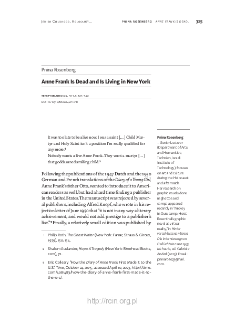
Obiekt
Tytuł: Anne Frank Is Dead and Is Living in New York
Inny tytuł:
Teksty Drugie Nr 1 (2024) - Special Issue - English Edition
Wydawca:
Miejsce wydania:
Opis:
21 cm ; Tekst pol., streszcz. ang.
Bibliografia:
1. Roth, Philip. The Ghost Writer. Farrar, Straus & Giroux, 1979.
2. Auslander, Shalom. Hope: A Tragedy. Riverhead Books, 2013.
3. Colleary, Eric. “How the Diary of Anne Frank First Made It to the U.S.” Time, October 24, 2015.
4. Kirshenblatt-Gimblett, Barbara and Jeffrey Shandler (eds.). Anne Frank Unbound: Media, Imagination, Memory. Indiana University Press, 2012.
5. Pinsker, Sanford. “Anne Frank and the ‘What If’ School of Fiction?.” Sewanee Review 122 (2) (2014).
![]()
6. Ozick, Cynthia. “Who Owns Anne Frank.” The New Yorker 73 (1997).
7. Spillius, Elizabeth Bott. “Freud and Klein on the Concept of Phantasy.” International Journal of Psycho-analysis 82 (2) (2001).
![]()
8. Kaplan, Brett Ashley. Jewish Anxiety and the Novels of Philip Roth. Bloomsbury, 2015.
9. Pozorski, Aimee. “How to Tell a True Ghost Story: The Ghost Writer and the Case of Anne Frank.” In Philip Roth: New Perspective of an American Author, edited by Derek Parker Royal. Prager Publishers, 2005.
10. Rohr, Susanne. “Trauma and Taboo: The Holocaust in Recent American Fiction.” In Wor(l)ds of trauma. Canadian and German Perspectives, edited by Wolfgang Klooss. Waxmann, 2017.
11. Rosenberg, Roberta. “'Diasporadic Humor’ and Jewish-American Identity.” Shofar 33 (3) (2015).
![]()
12. Spargo, Clifton R. “To Invent as Presumptuously as Real Life: Parody and the Cultural Memory of Anne Frank in Roth’s The Ghost Writer.” Representations 76 (1) (2001).
![]()
13. Rosenfeld, Alvin H. “Popularization and Memory: The Case of Anne Frank.” In Lessons and Legacies: The Meaning of the Holocaust in the Changing World, edited by Peter Hayes. Evanston, 1991.
14. Schneider-Mayerson, Matthew. “Popular Fiction Studies: The Advantages of a New Field.” Studies in Popular Culture 33 (1) (2010).
15. Dein, Simon. “The Origins of Jewish Guilt: Psychological, Theological, and Cultural Perspectives.” Journal of Spirituality in Mental Health 15 (2) (2013).
![]()
16. Bauman, Zygmunt. “The Holocaust’s Life as a Ghost.” In Social Theory after the Holocaust, edited by Robert Fine and Charles Turnerm. University of Liverpool Press, 2000.
![]()
17. Hartman. Geoffrey. The Longest Shadow. Indiana University Press, 1995.
18. Finkelstein, Norman. The Holocaust Industry. Verso, 2000.
![]()
19. Tova Reich, Tova. My Holocaust. HarperCollins, 2007.
20. Novick, Peter. The Holocaust in American Life. Mariner Books, 1999.
Czasopismo/Seria/cykl:
Zeszyt:
Strona pocz.:
Strona końc.:
Szczegółowy typ zasobu:
Identyfikator zasobu:
oai:rcin.org.pl:241931 ; 0867-0633 ; 10.18318/td.2024.en.1.18
Źródło:
IBL PAN, sygn. P.I.2524 ; kliknij tutaj, żeby przejść
Język:
Język streszczenia:
Prawa:
Licencja Creative Commons Uznanie autorstwa 4.0
Zasady wykorzystania:
Zasób chroniony prawem autorskim. [CC BY 4.0 Międzynarodowe] Korzystanie dozwolone zgodnie z licencją Creative Commons Uznanie autorstwa 4.0, której pełne postanowienia dostępne są pod adresem: ; -
Digitalizacja:
Instytut Badań Literackich Polskiej Akademii Nauk
Lokalizacja oryginału:
Biblioteka Instytutu Badań Literackich Polskiej Akademii Nauk
Dofinansowane ze środków:
Programme Innovative Economy, 2010-2014, Priority Axis 2. R&D infrastructure ; European Union. European Regional Development Fund
Dostęp:
Kolekcje, do których przypisany jest obiekt:
Data ostatniej modyfikacji:
12 lip 2024
Data dodania obiektu:
11 lip 2024
Liczba pobrań / odtworzeń:
1
Wszystkie dostępne wersje tego obiektu:
https://rcin.org.pl/ibl/publication/278158
Wyświetl opis w formacie RDF:
Wyświetl opis w formacie RDFa:
Wyświetl opis w formacie OAI-PMH:
| Nazwa wydania | Data |
|---|---|
| Rosenberg P. - Anne Frank Is Dead and Is Living in New York | 12 lip 2024 |
Obiekty Podobne
Lejeune, Philippe Rodak, Magda

 INSTYTUT ARCHEOLOGII I ETNOLOGII POLSKIEJ AKADEMII NAUK
INSTYTUT ARCHEOLOGII I ETNOLOGII POLSKIEJ AKADEMII NAUK
 INSTYTUT BADAŃ LITERACKICH POLSKIEJ AKADEMII NAUK
INSTYTUT BADAŃ LITERACKICH POLSKIEJ AKADEMII NAUK
 INSTYTUT BADAWCZY LEŚNICTWA
INSTYTUT BADAWCZY LEŚNICTWA
 INSTYTUT BIOLOGII DOŚWIADCZALNEJ IM. MARCELEGO NENCKIEGO POLSKIEJ AKADEMII NAUK
INSTYTUT BIOLOGII DOŚWIADCZALNEJ IM. MARCELEGO NENCKIEGO POLSKIEJ AKADEMII NAUK
 INSTYTUT BIOLOGII SSAKÓW POLSKIEJ AKADEMII NAUK
INSTYTUT BIOLOGII SSAKÓW POLSKIEJ AKADEMII NAUK
 INSTYTUT CHEMII FIZYCZNEJ PAN
INSTYTUT CHEMII FIZYCZNEJ PAN
 INSTYTUT CHEMII ORGANICZNEJ PAN
INSTYTUT CHEMII ORGANICZNEJ PAN
 INSTYTUT FILOZOFII I SOCJOLOGII PAN
INSTYTUT FILOZOFII I SOCJOLOGII PAN
 INSTYTUT GEOGRAFII I PRZESTRZENNEGO ZAGOSPODAROWANIA PAN
INSTYTUT GEOGRAFII I PRZESTRZENNEGO ZAGOSPODAROWANIA PAN
 INSTYTUT HISTORII im. TADEUSZA MANTEUFFLA POLSKIEJ AKADEMII NAUK
INSTYTUT HISTORII im. TADEUSZA MANTEUFFLA POLSKIEJ AKADEMII NAUK
 INSTYTUT JĘZYKA POLSKIEGO POLSKIEJ AKADEMII NAUK
INSTYTUT JĘZYKA POLSKIEGO POLSKIEJ AKADEMII NAUK
 INSTYTUT MATEMATYCZNY PAN
INSTYTUT MATEMATYCZNY PAN
 INSTYTUT MEDYCYNY DOŚWIADCZALNEJ I KLINICZNEJ IM.MIROSŁAWA MOSSAKOWSKIEGO POLSKIEJ AKADEMII NAUK
INSTYTUT MEDYCYNY DOŚWIADCZALNEJ I KLINICZNEJ IM.MIROSŁAWA MOSSAKOWSKIEGO POLSKIEJ AKADEMII NAUK
 INSTYTUT PODSTAWOWYCH PROBLEMÓW TECHNIKI PAN
INSTYTUT PODSTAWOWYCH PROBLEMÓW TECHNIKI PAN
 INSTYTUT SLAWISTYKI PAN
INSTYTUT SLAWISTYKI PAN
 SIEĆ BADAWCZA ŁUKASIEWICZ - INSTYTUT TECHNOLOGII MATERIAŁÓW ELEKTRONICZNYCH
SIEĆ BADAWCZA ŁUKASIEWICZ - INSTYTUT TECHNOLOGII MATERIAŁÓW ELEKTRONICZNYCH
 MUZEUM I INSTYTUT ZOOLOGII POLSKIEJ AKADEMII NAUK
MUZEUM I INSTYTUT ZOOLOGII POLSKIEJ AKADEMII NAUK
 INSTYTUT BADAŃ SYSTEMOWYCH PAN
INSTYTUT BADAŃ SYSTEMOWYCH PAN
 INSTYTUT BOTANIKI IM. WŁADYSŁAWA SZAFERA POLSKIEJ AKADEMII NAUK
INSTYTUT BOTANIKI IM. WŁADYSŁAWA SZAFERA POLSKIEJ AKADEMII NAUK
































